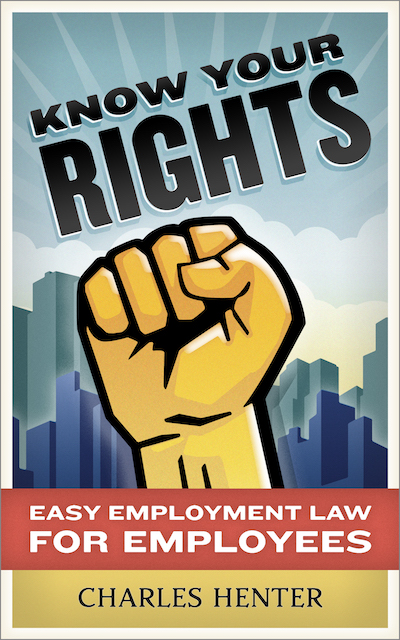When Mr. Henter give talks to other lawyers, he always tries to end with a top ten list of helpful pointers. Here are his top 10 tips for all employees. But please keep in mind, this is not meant as legal advice to any specific situation. In the real world and in your life, the accuracy and usefulness of anything always depends on the details.
(1) Obey first, grieve later. This is one of the basic rules of labor and employment law. You don’t want to get fired for insubordination while you try to decide whether your employer just asked you to do something unlawful. There is no question that if you are in such a position, it is both morally and legally troublesome. If you are forced to make a quick decision and in doubt about what to do, listen to your employer and do what he or she says. You can complain about it later while you still have a job.
(2) Know your deadlines. Almost everything in the law has a time limit. A potential lawsuit has a time limit by which it has to be filed. A charge of discrimination has to be filed within a certain number of days. A grievance has to be filed with your employer to protect yourself. If you don’t know these and other time limits, how will you know if you have all ready waited too long? So, please try to find out your time limits and act as soon as possible.
(3) Ask to review your employment file. If you work for the government and are a public employee, your employer usually has to give you access to your employment file if you request it. Private employees, well, you get what your employers want to give you. In general, you shouldn’t just wait for bad things to happen at work before asking to see your file. Make it a regular thing, sort of like a maintenance check. You take your car in for an oil change routinely, so why shouldn’t you ask to check your file routinely? Your job is probably more important than your car.
(4) Request your file from the EEOC. If you have all ready filed a charge of discrimination with the Equal Employment Opportunity Commission (EEOC) or your State agency and they dismissed your claim, write them a letter and ask for your file. You will get valuable information, including a detailed explanation from your employer about why, in their opinion, their actions were not against the law.
(5) Human Resources is not your friend. This is not meant to insult all the wonderful people who work in human resources or personnel departments. But at the end of the day, this department is there to protect the company and make sure it runs smoothly, not protect you. Do not make the assumption that they will take care of you, believe you in any way, or are somehow your friend. They are not.
(6) Does your employer want to fire you? Ask your employer to agree to unemployment benefits. People do not like confrontations. This is why people think lawyers are not people, because we look forward to them. When your employer is firing you, there just may be a little bit of guilt. If you ask them to not fight your eligibility for unemployment, they may agree. While that may not be a legally binding agreement, it might give you peace of mind knowing that some money will be flowing into your household in the short term.
There is another reason to do what you can to get unemployment benefits. If you were fired or had to leave your former employer for, let us say, less than glowing reasons, what will you say in your next job interview? If you are receiving unemployment, this is a small signal to a future employer that, at the very least, you were not fired for willful misconduct. Sometimes, that little bit of information can be the difference between getting the job and not.
(7) Write down things that happen to you at work. This is not about being paranoid, this is about protecting yourself. There is a risk that if you write down what happens to you at work that, if you ever end up in court against your employer, it may get these notes from you and try to use them against you. Fine. That is a small price to pay for having good notes about what happened so you don’t have to rely on your memory later. Trust me, there is a very good reason your employer takes notes after meetings with you, and it’s not about being nice and remembering that great joke you told either.
(8) Read the employment manual. Even defense lawyers will agree with me that this is a good idea for employees. You need to know what your employer says it will do, and what it thinks it can do. This is the best place to start.
(9) It’s not your job to improve the lives of your co-workers. This might sound dark, jaded, and skeptical. True. If nothing else, lawyers are professional skeptics. At HenterLaw, we often get calls from people who have just been fired because they were the “problem” employee. They complained about things that would help improve the general workplace. They complained about how other people were not efficient. They complained that other employees were not following the “rules”. These types of people lose their jobs more often than others. Why? Because of at-will employment. Without any job security, whenever an employee complains about something that isn’t protected by some law (retaliation, whistle-blowing, discrimination, freedom of speech, etc.), that employee can be fired even for complaining. Keep in mind that there can be a fine line between properly and helpfully improving your performance and others’ work and complaining. Guess who determines if you’re helpful or a complainer? Your employer.
(10) When in doubt, please call a lawyer. If you have a question about your job or about how you’ve been treated that you can’t understand, contact one of us. We are not all bad.
This post is a modified version of a section that appears in Mr. Henter’s book, Know Your Rights: Easy Employment Law for Employees.




© 2018 HenterLaw PLC. Charles Henter is the responsible attorney for this website.

